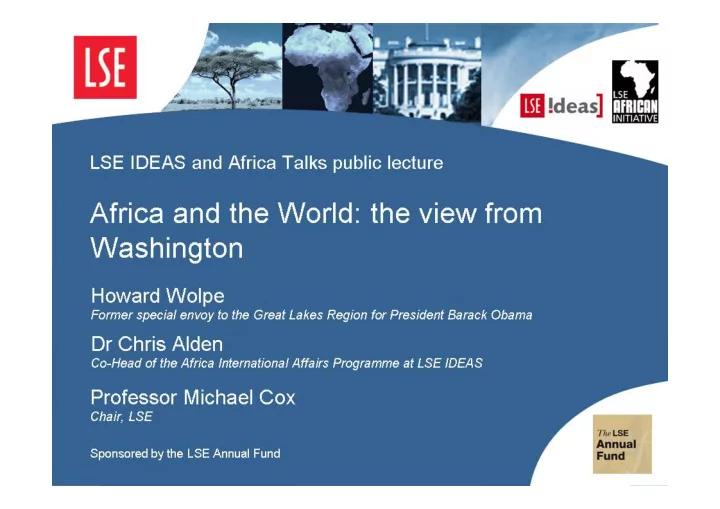

LSE IDEAS and Africa Talks public lecture Africa and the World: the view from Washington Howard Wolpe Former special envoy to the Great Lakes Region for President Barack Obama Dr Chris Alden Co-Head of the Africa International Affairs Programme at LSE IDEAS Professor Michael Cox Chair, LSE Sponsored by the LSE Annual Fund
����������������������������� ���������������������������� ������ ��������������������������������������������������������������������������������������� ���������������������������������������������������������������� ����������������� �����������������������������������������������
The Conventional Wisdom � Assumes principal challenges are rational and structural: get the institutions right, and there will be stability and security � Rooted in an adversarial paradigm: competition seen as defining characteristic of democracy � Sees moral and political pressure, combined with legal sanctions, as the most effective means of deterring bad behavior IRÉNÉ
What is Wrong with this Picture? Misunderstands Democracy � Democracy depends not only on competition but on an underlying set of agreements: definition of the national community, rules of the game, styles of communication � Democracy depends on cooperation as well as competition � Democracy depends on sense of common ground among members of the national community � Political competition is tolerable only when these underlying conditions are in place IRÉNÉ
What is Wrong with this Picture? Ignores the divided nature of most transitional societies � Culturally plural societies often have weak sense of national identity and community � No recognition of “connectedness” � Tendency toward dehumanization of “outsiders” � Moral and legal pressure effective only within the “in- group” IRÉNÉ
What is Wrong with this Picture? Mistakes differences in perceptions for a conflict over values � No shortage of “democrats” � Problem is the definition of the political community IRÉNÉ
What is Wrong with this Picture? Fails to comprehend that the essential task of peace and democracy-building in divided societies is building a recognition of commonalities and interdependence IRÉNÉ
A New Strategic Perspective: The Four Imperatives of Sustainable Peace and Democracy � Transform the war-induced, zero-sum paradigm � Restore trust and rebuild fractured relationships � Build a new consensus on “rules of the game” � Strengthen communication and negotiation skills IRÉNÉ
The Missing Link: Building Collaborative Capacity Among Leaders � Broadening the notion of “capacity building” � Joining skills of trainers with those of diplomats � Peace-building through leadership training: Burundi, DRC, Liberia, Timor-Leste � Re-defining the role of the international community IRÉNÉ
Building Sustainable Peace and Democracy Through Leadership Training: The Case of Burundi IRÉNÉ
The Challenge � Humanitarian disaster � Traumatized society � Polarized Leadership � Large gap between leaders and population � Unequal distribution of limited resources � Fragmented peace process IRÉNÉ
The Response: A Long-term Training Program for Key Leaders � The BLTP “95” � Security Sector � Political party leaders � Government � Community-Based Program IRÉNÉ
Keys to Building Collaborative Capacity: (1) Trainers and Training Methodology • Process-centric • Experience-based • Interactive • Communications • Interest-based negotiations • Analysis of Conflict • Climate of Mutual Trust • Building relationships • Long-term: no quick fix IRÉNÉ
Keys to Building Collaborative Capacity: (2) Getting the Right People into the Room � Entry Points Will Vary from Country to Country � Importance of national “ownership” of the process � Advantages of framing process as “technical capacity building” rather than a political negotiation � Emphasis on inclusivity � Participants invited in their individual capacities, not as representatives of their organizations IRÉNÉ
Conclusions: Lessons Learned � Importance of addressing process and attitudinal dimensions of post-conflict reconstruction � Holistic approach to peace-building: need to engage key leaders directly in long-term training program � Must distinguish between “technical” capacity and capacity in “collaborative decision-making” � Need for synergy between efforts of diplomats and trainers IRÉNÉ
LSE IDEAS and Africa Talks public lecture Africa and the World: the view from Washington Howard Wolpe Former special envoy to the Great Lakes Region for President Barack Obama Dr Chris Alden Co-Head of the Africa International Affairs Programme at LSE IDEAS Professor Michael Cox Chair, LSE Sponsored by the LSE Annual Fund IRÉNÉ
Recommend
More recommend